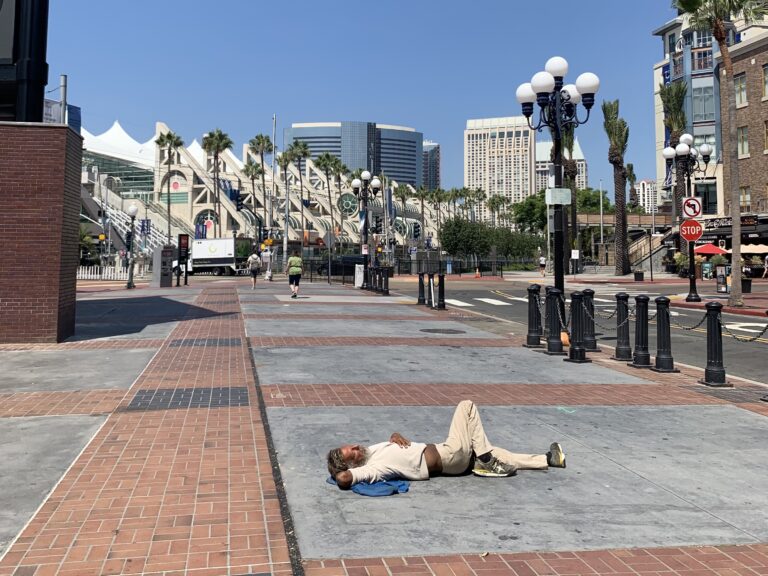The Supreme Court’s Grants Pass decision from early June permitted local governments to criminalize and prosecute public camping, which may affect over 10,000 San Diegans.
This decision allows state and city governments to criminalize and enforce public camping ordinances, effectively allowing cities to jail individuals who sleep on public land. It will impact the roughly 650,000 people across the country who find themselves without shelter.
A document filed to the Supreme Court by the city of Grants Pass, Oregon, recognizes the nuance of the challenges posed by aiding unsheltered and homeless individuals, saying, “The causes [of homelessness] are varied and complex, the appropriate public policy responses perhaps no less so.”
Proponents of the Supreme Court ruling have praised the decision for providing safer and more sanitary conditions for both the general public and unhoused individuals living in encampments on public land.
California Governor Gavin Newsom, a consistent proponent of the SCOTUS decision, wrote, “Judicially created rules, however well-intentioned those rules may be, [should] not hamstring state and local governments’ ability to address these problems, and [should] not impede common-sense measures to keep people safe.”
Those who have voiced concern surrounding the decision stress that the criminalization of public camping and disbursement of encampments will only do what prior homeless legislation has done in the past–cause unsheltered individuals to relocate.
In a statement by San Diego’s Regional Task Force on Homelessness that “expressed profound disappointment” regarding the SCOTUS decision, RTFH CEO Tamera Kohler said, “This ruling, by a divided Supreme Court, won’t help us solve homelessness, but it will harm people experiencing homelessness. It’s inhumane. It stands up more barriers to housing. And it gives a green light to politicians and police who prefer arrests and time behind bars, rather than real solutions.”
The Eighth Amendment and Precedent
Prior cases similar to Grants Pass have been assessed under the precedent set by the case of Martin v. Boise, which determined that when the number of homeless individuals exceeds that of available shelter beds, criminalizing public camping falls under the Eighth Amendment’s Cruel and Unusual Punishments Clause. This effectively stated that local governments could not criminally prosecute individuals sleeping or living on public land.
However, many cities expressed opposition to this interpretation of the Eighth Amendment Clause, within the Grants Pass v. Johnson case.
The appeal filed by Grants Pass cited a prior interpretation of the clause by Powell v. Texas, which clarified that “The Cruel and Unusual Punishments Clause focuses on the question what ‘method or kind of punishment’ a government may impose after a criminal conviction, not on the question whether a government may criminalize particular behavior in the first place.”
This interpretation of the Cruel and Unusual Punishments Clause was effectively upheld by the Supreme Court’s decision in the Grants Pass v. Johnson case.
Governor Gavin Newsom’s State Directive
On July 25, less than a month after the Supreme Court decision, Newsom directed California state agencies to address “dangerous encampments” across the state. The executive order details procedures that will accompany the disbursement of these encampments. The procedures include notifying unhoused people in the area to vacate the premises 48 hours prior to the removal of people and items present in the area.
In a video posted to X, Newsom said, “It’s time to move with urgency at the local level to clean up these sites, to focus on public health and focus on public safety. There are no longer any excuses.”
Newsom’s order does not mandate law enforcement to provide shelter options for the individuals within encampments, however, it does instruct them to contact “service providers to request outreach services.”
California has the highest rate of unsheltered people in the nation, accounting for 49% of unsheltered people in the entire country. This is eight times the rate of that found in the second highest state, Florida, according to nationwide Point-in-Time Counts.
The PIT Count is a nationwide assessment that estimates the number of people experiencing homelessness annually. Volunteers walk the streets on a chosen day in January and account for all of the unsheltered individuals they come across in any given city or county. According to the PIT Count, over 10,000 people in San Diego City and County are experiencing homelessness.
Impacts on the San Diego Community
A recent Unsafe Camping Ordinance, which went into effect in San Diego on June 29, outright bans any kind of tent camping in “sensitive areas” such as parks, canyons and near schools.
“We are not going to be a city that’s content leaving people to live on our streets, sidewalks, along our riverbeds or in our canyons,” Mayor Todd Gloria said regarding addressing San Diego encampments in early June. “We cannot surrender our sidewalks to unsafe encampments. The bottom line is that sidewalks are not homes. We have shelter options that can get folks off the street right now, as well as storage for their belongings.”
Many San Diego leaders have spoken publicly about the sanitation, safety and crime issues presented by encampments and public camping within the county.
In a brief filed by San Diego District Attorney Summer Stephens and others, in support of the Supreme Court decision, the document said homeless individuals were at significantly increased risk of both being victims and perpetrators of violent or serious felony crimes. Proponents of the disbursement of these encampments claim exposure to encampment environments not only encourages crime but also exposes homeless individuals to a far greater likelihood of being victims of serious crimes.
The response to the SCOTUS decision remains split, with the CEO of the National Alliance to End Homelessness expressing the primary concern of critics of the decision, “This ruling allows leaders to shift the burden to law enforcement. This tactic has consistently failed to reduce homelessness in the past, and it will assuredly fail to reduce homelessness in the future.”
The impacts of the Supreme Court’s decision and Newsom’s directive will be seen on the streets of San Diego in the near future.






